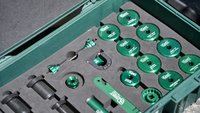Anyone have first-hand knowledge/experience with Germany's renewable energy push? From one side it is being called a disaster, the other trumpets the great strides have been made. The Truth may be somewhere in between. What is the reality?
Energiewende?
They shut down nuclear plants and have since opened coal and gas plants to make up for thee shortfalls.
Sounds like a disaster to me.
duncan: what you want to know exactly?
@fast orange: that's not true, where do you get these infos? we closed down old plants and replaced them by newer, cleaner ones but the total energy produced by coal/gas hasn't increased. they are still needed for times without wind/sun as backups as we don't have that much mountains/space to build lots of pumped storage hydro power stations.
german energy sources of the last years:

braunkohle: brown coal
kernenergie: nuclear energy
steinkohle: black coal
erdgas: natural gas
erneuerbare energien: renewable energy
sonstige energieträger: other sources of energy
energy mix of 2013:

more of that: http://www.bdew.de/internet.nsf/id/energiemix-de (german content)
the only thing that rises is clean energy, to the loss of nuclear energy. what also has risen is the price of energy, currently in the 25-27ct/kwh area. small price to pay compaired to the costs the generations after us have to pay for storing our nuclear waste.
edit: keep an eye on this topic in the winter, lots of nuclear power plants in france and most of belgium are closed due to security issues, german clean energy will be sold to these countries to prevent a black out as they are not prepared to compensate on their own…
@fast orange: that's not true, where do you get these infos?
I heard from a German friend that the power grid has been less reliable than ever and that Germany has more functioning alternative energy now but is also producing more co2 than they were before the push to alternatives.
I admit I took his word for it but if you can prove him wrong I'm open to being corrected. Also graphs pointing out the division of energy sources don't really take into account overall co2 emissions from pre-alternative energy push to post and if it is true that co2 emissions are higher from Germany now than it's been nothing more than a huge expensive learning process which is putting it nicely.
what also has risen is the price of energy, currently in the 25-27ct/kwh area.
To put this in context for people in BC, residential electric rate is about 7 cents/kWh and natural gas equivalent is probably less than 1/2 of that.
duncan: what you want to know exactly?
An unbiased explanation of what has happened, for better and/or worse since the program was implemented. If the EU/NATO/Western Europe wants total political [HTML_REMOVED] economic freedom, it is probably in its best interest to decouple itself from Russian natural gas. I'm sure the rest of Europe is watching. I'm a little surprised there is so little hydroelectric power generation in Germany, perhaps due to my ignorance of Germany's geography. Ethiopia has more hydroelectric generation capacity than Germany.
again, no mountains. the big rivers have a lot of hydro plants though. plus we use the rivers for shipping so you can't build one every few kilometers.
what has happend after the programm? renewables went up, prices went up (mostly only for consumers, big energy hungry companies can get away with paying the "EEG-Umlage" (renewable energy law contribution, at the moment at 6,24ct/kwh, next year it should be lower again). people in the south with roofs in the right direction profited massively, my parents for example bought a 3,5kw solar panel around 2010 and get nearly 40ct for every kw/h they put into the grid, nowadays it's much lower around 15ct as far as i know but solar panels are much cheaper since then. now starts the time when solar panels + battery packs come into affordable ranges so you don't need to feed the grid and use it all for yourself. problems that arise is that the "rich" house owners can produce their own electricity and the "poor" people in the city finance it for them through the higher prices. in the long end i think paying for the kw/h will go away as more and more capacity is avaiable and power will go the way of the internet connection: full flatrate, especially when more and more e-cars are on the streets and function as aditional buffers. the newish coal/gas plants will stay though for the next years as they are planned as shadow plants, always ready to jump in if there's no sun/wind.
To put this in context for people in BC, residential electric rate is about 7 cents/kWh and natural gas equivalent is probably less than 1/2 of that.
isn't bc mostly hydro powered?
I heard from a German friend that the power grid has been less reliable than ever and that Germany has more functioning alternative energy now but is also producing more co2 than they were before the push to alternatives.
I admit I took his word for it but if you can prove him wrong I'm open to being corrected. Also graphs pointing out the division of energy sources don't really take into account overall co2 emissions from pre-alternative energy push to post and if it is true that co2 emissions are higher from Germany now than it's been nothing more than a huge expensive learning process which is putting it nicely.
"The economic outcome of the EEG for Germany has been considerable. Building a safe and clean power supply incurs costs, but the net benefit of the EEG exceeds the costs of initial investment by 3.2 billion Euros[16] When the external costs avoided were compared to the compensation grid operators were paid for electricity from renewable energies in an early study, the reduced environmental impacts and related economic benefits far outweighed additional costs to compensate producers of electricity from renewable sources. (Krewitt and Nitsch,2001)"
http://en.wikipedia.org/wiki/German_Renewable_Energy_Act#EEG-Umlage
isn't bc mostly hydro powered?
Something around 95% although it varies year to year.
what are the other 5%?
I thought we sold some to the states and imported their dirty electrons.
Ha Ha! Made you look.
what are the other 5%?
Most likeley cogen, biomass, wind, solar. A gas plant or two. A little purchased from out of province (Alberta), which is mostly coal generation.
When one person suffers from a delusion, it is called insanity.
When many people suffer from a delusion, it is called religion.
what are the other 5%?
My 95% guess was a little low, but the act requires 93%.
___ F12 _F13 _F14 F15 F16 _F17
____ Tgt Tgt _Tgt
Clean Energy (%) 98.1 98.2 97.1 93.0 93.0 93.0
Break down for F14
Sources Of Supply
__Generating
__Capacity Gigawatt-
__Megawatts) Hours %
Hydroelectric generation
Gordon M. Shrum 2,730 13,650 16.7
Revelstoke _2,480 8,121 _10.0
Mica __1,805 7,030 _8.6
Kootenay Canal 583 2,935 _3.6
Peace Canyon _694 3,423 4.2
Seven Mile _805 3,183 _3.9
Bridge River 478 2,397 _2.9
Other _1,352 4,589 _5.6
===================================
Total __10,927 45,328 55.5
Thermal generation
Burrard _950 84 _0.1
Other _170 184 ____0.2
Purchases under
long-term
commitments _15,300 _18.8
Purchases under
short-term
commitments _20,764 _25.5
Other ___(103 ) (0.1 )
Total __12,047 81,557 __100.0
From the F14 annual report:
http://www.bchydro.com/content/dam/BCHydro/customer-portal/documents/corporate/accountability-reports/financial-reports/annual-reports/bc-hydro-annual-report-2014.pdf
The facilities with gas [HTML_REMOVED] diesel generation are listed here on page 2, right side:
http://www.bchydro.com/content/dam/BCHydro/customer-portal/documents/corporate/accountability-reports/financial-reports/annual-reports/bc-hydro-annual-report-quick-facts-june-2014.pdf
I thought we sold some to the states and imported their dirty electrons.
I think we sell our hydro power to the USA during their peak demand periods and import their nuclear power during their low demand periods. That's the great thing about hydroelectric, in a matter of minutes generation can be started or shut down. With nuclear that takes months. I'm told we have pumps that use cheap USA nuclear power to bring water back into the reservoir, then when it's time to sell we let the water out, then repeat.
Forum jump:







